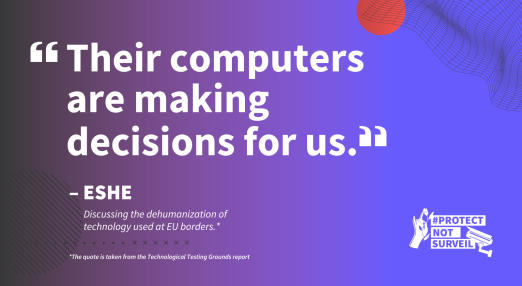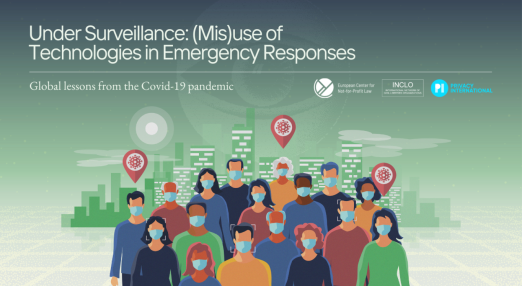TikTok’s “Focused View”: the creepy new feature aims to monetise your emotions
Ever heard of TikTok’s “Focused View”? With this new feature launched in October 2022, TikTok claims it can track your emotions to sell ads. We have our doubts if that’s even possible – but it certainly is invading your privacy to drive profits. Here is why, and what it means for users in Europe.
Filter resources
-

TikTok’s “Focused View”: the creepy new feature aims to monetise your emotions
Ever heard of TikTok’s “Focused View”? With this new feature launched in October 2022, TikTok claims it can track your emotions to sell ads. We have our doubts if that’s even possible – but it certainly is invading your privacy to drive profits. Here is why, and what it means for users in Europe.
Read more
-

TrustPid: Baking ad tracking into the internet infrastructure
A consortium of Europe’s largest telecommunications operators (telcos) has proposed a new kind of tracking ads system to challenge commercial surveillance heavyweights like Google and Facebook. The new tracking system, misleadingly dubbed ‘TrustPid’, would be baked into the internet’s network infrastructure – potentially with little recourse or defence for users.
Read more
-

#ProtectNotSurveil: EU must ban AI uses against people on the move
As the European Parliament regulates the most harmful AI technologies, a coalition of civil society calls on the EU to #ProtectNotSurveil people on the move.
Read more
-

e-Evidence compromise blows a hole in fundamental rights safeguards
In December 2022, the Council and the European Parliament agreed on a final compromise text on the so-called ‘e-Evidence’ proposals. With major concessions given to the Member States’ position, the results of these trilogues negotiations are of bad omen for people’s rights and freedoms.
Read more
-

EDRi-gram, 1 February 2023
In this first EDRigram edition of 2023, we want to take a look back at what we collectively achieved in 2022. Together, we mobilised people and organisations in key moments and continued to strengthen our network and to contribute to the design of a decolonising programme for the field. We are also exploring why the European Commission's blocking obligations for internet services providers in the context of addressing the spread of child sexual abuse material online are impossible. Stay tuned: Today, the European Parliament is voting on the regulation on the transparency and targeting of political advertising proposal which aims to tackle data-driven vote manipulation.
Read more
-

Phone unlocking vs biometric mass surveillance: what’s the difference?
Facial recognition is one of the most hotly-debated topics in the European Union’s (EU) Artificial Intelligence Act. Lawmakers are more aware than ever of the risks posed by automated surveillance systems which pervasively track our faces – as well as our bodies and movements - across time and place. This can amount to biometric mass surveillance (BMS), which undermines our anonymity and freedom, and weaponises our faces and bodies against us. The article explores the types of biometric technology and their implications.
Read more
-

Member States want internet service providers to do the impossible in the fight against child sexual abuse
In May 2022, the European Commission presented its proposal for a Regulation to combat child sexual abuse (CSA) online. The proposal contains a number of privacy intrusive provisions, including obligations for platforms to indiscriminately scan the private communications of all users (dubbed ”chat control”). There are also blocking obligations for internet services providers (ISPs), which is the focus of this article.
Read more
-

The UK will treat online images of immigrants crossing the Channel as a criminal offence
On 17 January, the United Kingdom (UK) government announced that online platforms will have to proactively remove images of immigrants crossing the Channel in small boats under a new amendment to be tabled to the Online Safety Bill. The announcement, intended to bolster the UK’s hostile immigration policy, has been met with concern among the British public and charities working with people on the move.
Read more
-

Under surveillance: (mis)use of technologies in emergency responses
In the months following the beginning of the COVID-19 pandemic, more than half the world’s countries enacted emergency measures. Within this broader context, we have seen a rapid scaling up of governments’ use of technologies to enable widespread surveillance. How has this impacted civil society groups globally?
Read more
-

Looking back at 2022: Protecting and advancing digital rights in times of crisis
In moments where we should be urgently tackling the climate crisis and working towards peace and justice worldwide, state funds and efforts seem to reinforce militarisation, fuel the climate crises and injustice. In response to increased surveillance and control practices coming from governments and private companies, EDRi members and partners have put forward a vision in which people live with dignity and vitality. What have we collectively achieved in 2022?
Read more
-

What are the provisions of new policing draft laws
The SHARE Foundation has consistently advocated against the legalisation of mass, indiscriminate biometric surveillance for the past four years, particularly during the consultation process launched upon the withdrawal of the first Draft Law on Internal Affairs. A new draft with old fundamental issues is now before us. The public hearing is open until the end of December.
Read more
-

EU watchdog finds European Commission failed to protect human rights from its surveillance aid to African countries
The European Ombudsman has found that the European Commission failed to take necessary measures to ensure the protection of human rights in the transfers of technology with potential surveillance capacity supported by its multi-billion Emergency Trust Fund for Africa.
Read more
